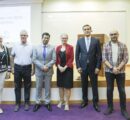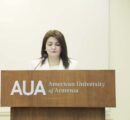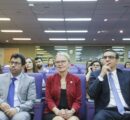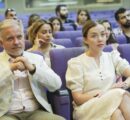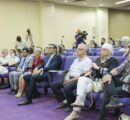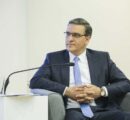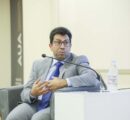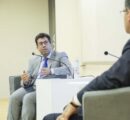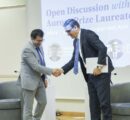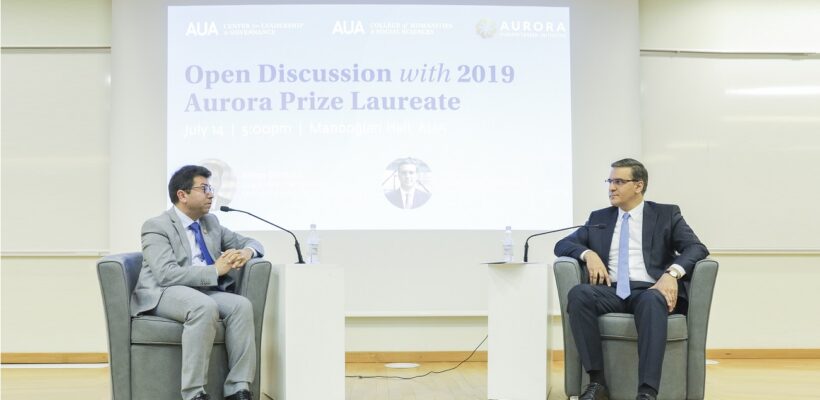
AUA Hosts 2019 Aurora Prize Laureate Mirza Dinnayi
3 min readYEREVAN, Armenia — On July 14, the American University of Armenia (AUA) hosted the 2019 Aurora Prize Laureate Mirza Dinnayi for an open discussion. A Yazidi activist and co-founder of Air Bridge Iraq humanitarian initiative, Dinnayi has dedicated his whole life to saving the victims of the Iraq war, evacuating women and children from territories controlled by ISIS and providing them with rehabilitation and support. Even after surviving a helicopter crash back in 2014, he remains committed to his mission of helping his people and fighting against terrorism.
The Chair of the Master of Laws (LL.M.) program Adelaida Baghdasaryan gave the welcoming remarks and introduced the guest speaker to the audience. A short documentary followed, depicting Mirza Dinnayi’s path and humanitarian activity, portraying the terrors of war crimes, mass violence, and genocide committed against the Yazidis of Iraq by the Islamic State. Dinnayi has rescued more than 1,500 victims of terror and rehabilitated hundreds of former ISIS sex slaves. “I have a dream to change the world, so genocides never happen again,” he declares in the documentary.
The screening was followed by a discussion moderated by Dr. Arman Tatoyan, AUA professor and former human rights defender of the Republic of Armenia. Dr. Tatoyan and Dinnayi discussed questions related to humanitarian crises, Dinnayi’s personal experience as a humanitarian activist, his motivation for his cause, the role of the international community in preventing crimes against humanity, etc. When asked what resources, skills, or institutions the society needs to collectively address humanitarian crises, Dinnayi remarked that nowadays, as the world is undergoing dramatic events and transformations, academic establishments should raise awareness about injustice and fight for humanist values. He highlighted that academic institutions, such as universities, have the power to stand up for important causes by interacting with the outside world. “You [universities] are making the leaders,” he said, noting that the role of education and universities is crucial in preventing humanitarian crises. Dinnayi also advised students to engage in social activities and volunteering, interact with the community by listening to “the voice of the street,” and approach their jobs with devotion.
Reflecting on the role of the Aurora Prize on his activity, Dinnayi emphasized that it has had a significant impact. Thanks to the prize, he was able to allocate resources to humanitarian projects aimed at improving the lives of the victims of the Iraq war, including the construction of a cultural center in Sinjar. “The impact of the Aurora Prize was huge in [advancing] my cause. It definitely gave me a platform and voice wherever and whenever I had to act in order to defend human rights,” he noted.
The session was summed up with an open discussion of questions raised by the audience engaging everyone in an active exchange of ideas with the guest speaker. Given that Dinnayi is among the few international activists who visited Artsakh after the war, he was also asked a question about the Artsakh conflict and role of the international community in the conflict resolution. In response, Dinnayi noted that while in most cases, the international community entertains solidarity with the people, on the level of international law everything is more complicated. Still, he hopes for the peaceful resolution of the issue.
Dr. Tatoyan thanked Dinnayi for his visit to AUA, wishing the Yazidi community in Armenia peace, prosperity, and strength. “In collaboration, together, we can do more to change the world for the better,” he stated.
The recorded livestream of the discussion can be viewed on YouTube.
Founded in 1991, the American University of Armenia (AUA) is a private, independent university located in Yerevan, Armenia, affiliated with the University of California, and accredited by the WASC Senior College and University Commission in the United States. AUA provides local and international students with Western-style education through top-quality undergraduate, graduate, and certificate programs, promotes research and innovation, encourages civic engagement and community service, and fosters democratic values.

